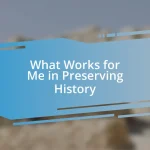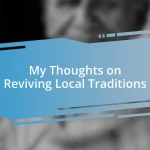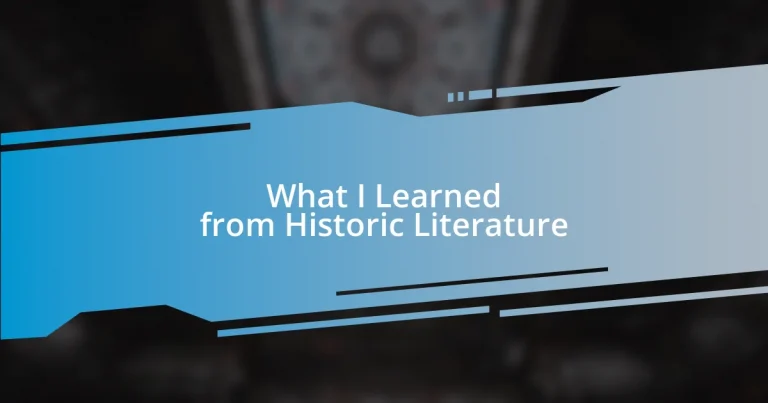Key takeaways:
- Literature reflects society and emotions, offering insights into human experiences, struggles, and social issues that remain relevant across time.
- Key themes in historic literature, such as love, social injustice, and identity, reveal deep truths about human nature and encourage self-exploration.
- Iconic authors teach resilience and the power of empathy, urging readers to recognize their capacity for change and connection through shared experiences.
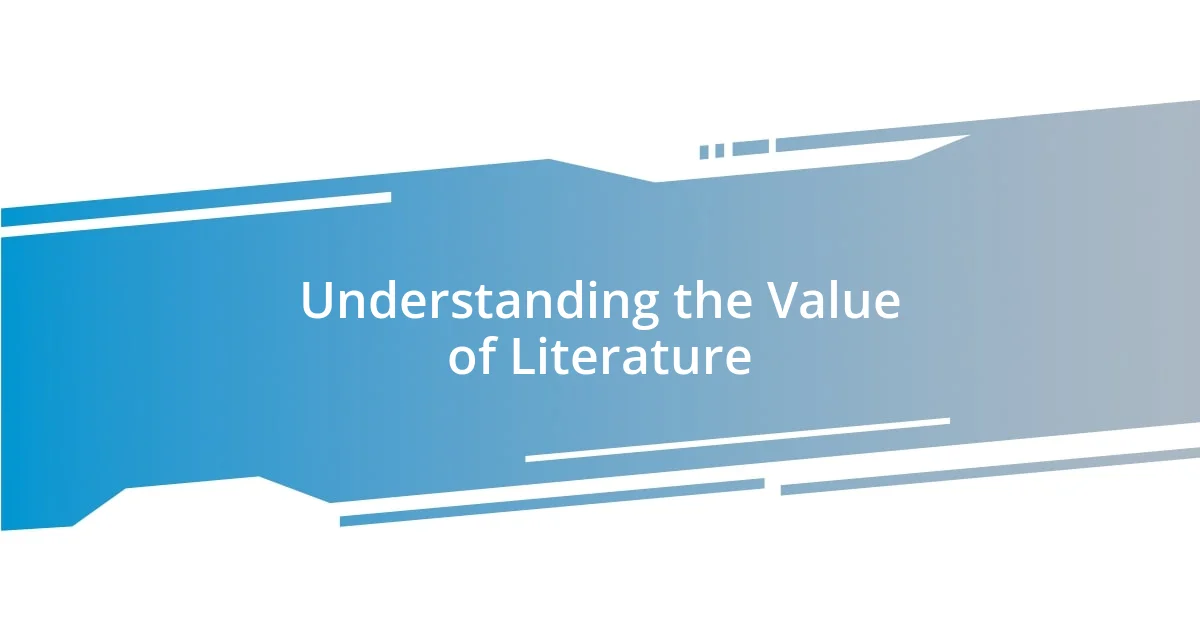
Understanding the Value of Literature
Literature serves as a mirror, reflecting the society and emotions of its time. I remember reading “To Kill a Mockingbird” in high school, feeling deeply moved by its themes of injustice and empathy. Did that resonate with anyone else? It helped me understand the struggles people faced, making me question my own environment and beliefs.
When I dive into a novel, it’s like stepping into another world, broadening my perspective. I recall getting lost in “Pride and Prejudice” and appreciating the complexities of love and class. How does a story from centuries ago still hold relevance today? It invites us to explore our own realities while providing a sense of connection to humanity across time.
There’s also an undeniable emotional depth in literature that can heal and inspire. After facing a tough day, I found solace in books like “The Alchemist,” which reminded me of the importance of pursuing dreams despite obstacles. Isn’t it fascinating how a simple story can uplift our spirits? That’s the true power of literature: its ability to touch hearts and foster growth.
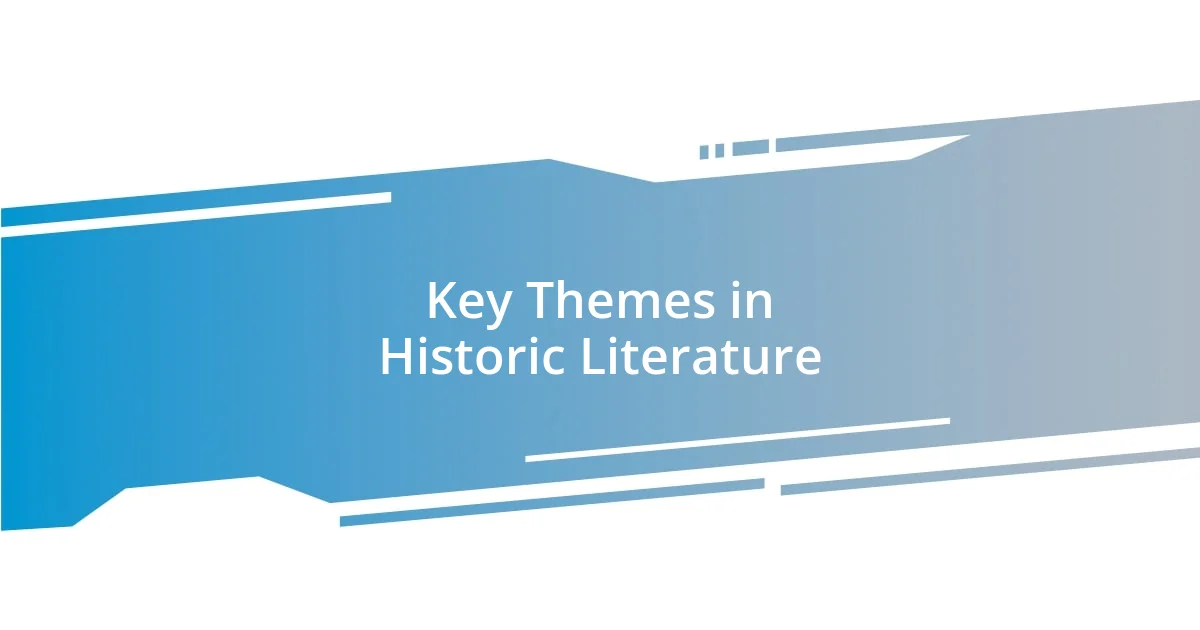
Key Themes in Historic Literature
Historic literature often explores universal themes that remain relevant, regardless of the era. For instance, I recall reading “The Great Gatsby” and being captivated by the theme of the American Dream, juxtaposed with the harsh reality of obsession and unfulfilled aspirations. It made me reflect on my own dreams and the sacrifices I might face along the way.
Key themes in historic literature include:
– Love and Sacrifice: Characters often make profound sacrifices for their loved ones, reflecting the depth of human relationships.
– Social Injustice: Many works highlight societal inequalities, urging readers to grapple with issues that persist today.
– Identity and Self-Discovery: Characters often embark on journeys that reveal deeper truths about themselves, mirroring our own journeys of self-exploration.
– Conflict and Resolution: The struggle between opposing forces often drives the narrative, showcasing the complexities of human nature.
– Mortality and Legacy: Many stories delve into the meaning of life and what we leave behind, prompting us to consider our own impact on the world.
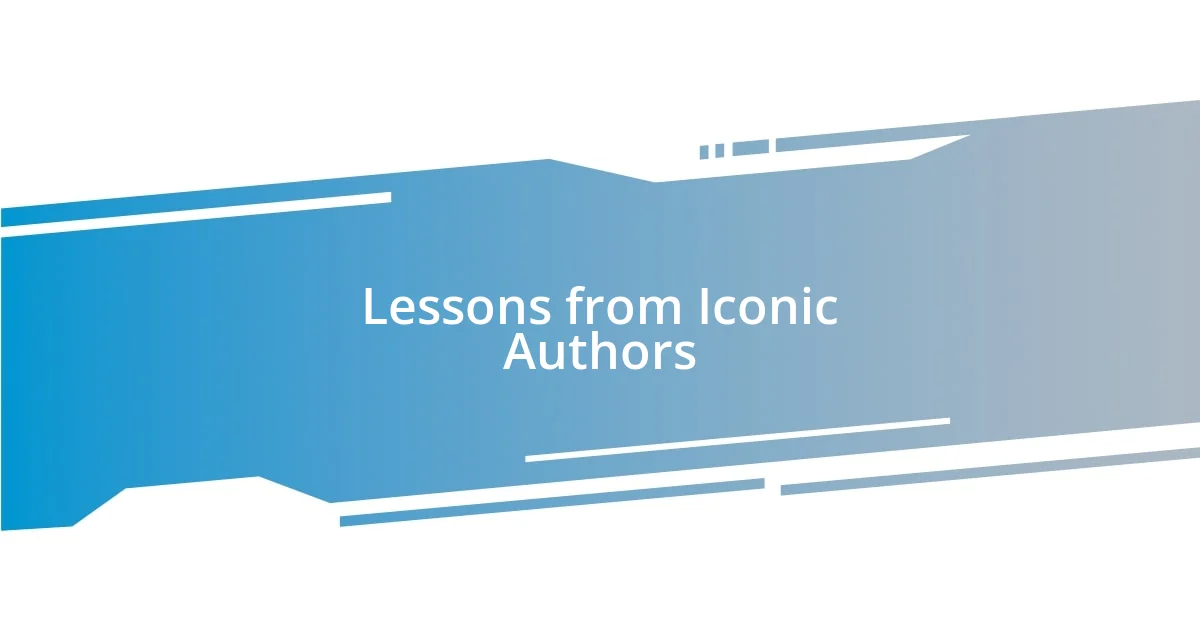
Lessons from Iconic Authors
When reflecting on the lessons from iconic authors, I find myself drawn to the resilience of characters crafted by them. Reading “1984” was a profound experience. Watching Winston’s fight against oppressive control made me appreciate the significance of free will. It’s a reminder that our voices matter, and even small acts of resistance can lead to greater change. Have you ever felt that urge to challenge the status quo in your life?
I also admire how some authors explore the complexity of human nature. In “The Catcher in the Rye,” Holden Caulfield’s struggles with identity and the harshness of adulthood spoke to me deeply. It’s reassuring to know that feeling lost is part of the human experience. His journey made me realize that vulnerability can be a source of strength. Isn’t it eye-opening how literature can validate our feelings and experiences?
The wisdom instilled by writers like Maya Angelou resonates powerfully, particularly in her work, “I Know Why the Caged Bird Sings.” Through her story, I learned about the importance of resilience and self-acceptance in the face of adversity. Her ability to transform pain into art is something I strive for in my creative endeavors. How do you turn your challenges into something meaningful? It’s these lessons in courage and authenticity that encourage me to embrace my own story.
| Author | Key Lesson |
|---|---|
| George Orwell | Value of free will and the power of resistance |
| J.D. Salinger | Acknowledging vulnerability as a source of strength |
| Maya Angelou | Transforming pain into art through resilience |
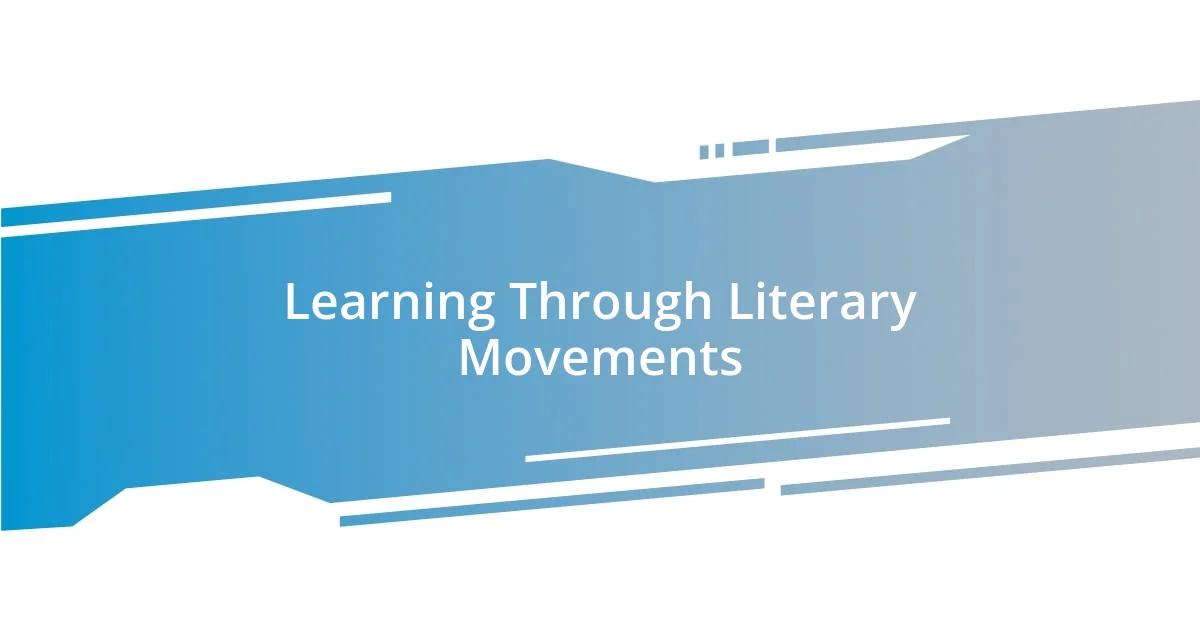
Learning Through Literary Movements
Reflecting on literary movements, I’ve found that they often mirror the societal shifts of their times. For instance, the Enlightenment encouraged intellectual freedom and the questioning of traditional authority. This movement inspired me, as I recognized the importance of questioning norms in my own life; isn’t it fascinating how literature can spark a revolution in our thinking?
Romanticism, on the other hand, taught me the value of emotion and individualism. When I studied the works of poets like Wordsworth and Coleridge, I felt a profound connection to nature and the human spirit. Their passionate exploration of feelings reminded me of my own experiences hiking in the woods, where the beauty of the world can evoke such deep introspection. How often do we pause to appreciate that singular moment of connection with our surroundings?
Then there are the stark realities presented during the Modernist movement. Reading Fitzgerald’s “Tender is the Night” opened my eyes to the disillusionment and fragmentation that followed the World War I era. The characters’ struggles felt so relatable; it made me ponder the chaos of contemporary life. It’s this kind of reflection that encourages us to engage with our own complexities, motivating us to seek clarity amid the noise. Have you ever found clarity in chaotic moments through literature?
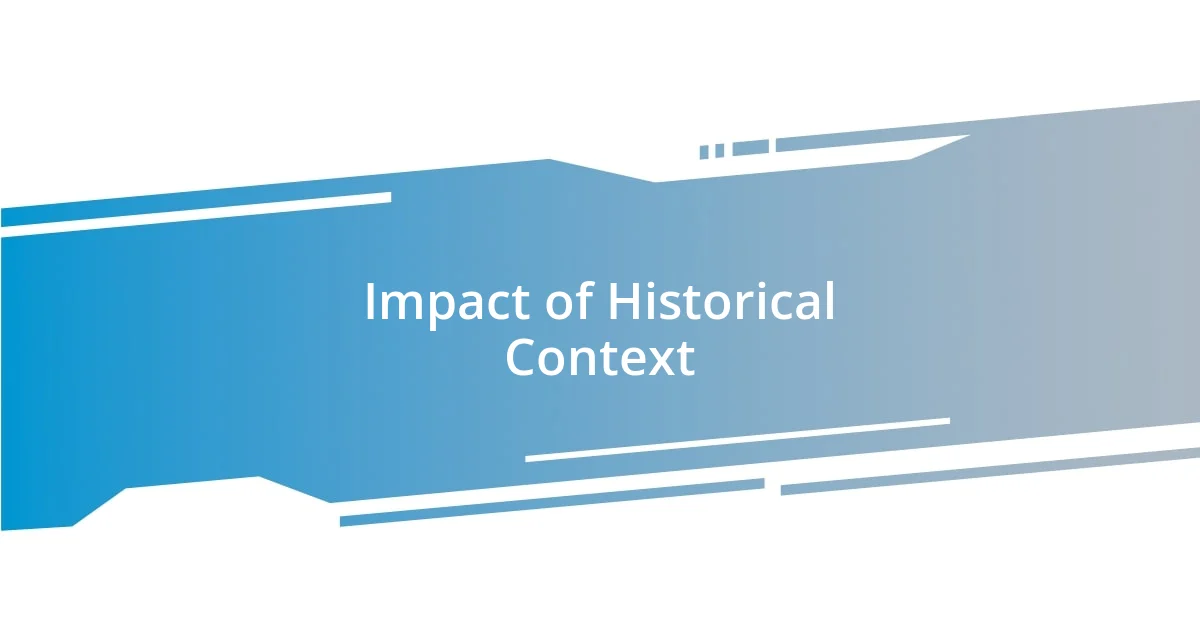
Impact of Historical Context
The historical context in which a literary work is created profoundly shapes its themes and messages. For example, reading works from the Harlem Renaissance, like Zora Neale Hurston’s “Their Eyes Were Watching God,” allowed me to understand the struggle for identity in a post-slavery America. It made me reflect on how social upheaval can fuel artistic expression and how history can paint the backdrop for personal journeys. Have you ever considered how a society’s circumstances influence the stories that emerge from it?
When I navigated through the grim realities depicted in texts from the Victorian era, I truly felt the constraints society placed on individuals. In novels like Charles Dickens’ “Great Expectations,” I experienced the tension between aspiration and class limitations, making me mindful of how societal norms can restrict personal growth. It’s remarkable how these historical lenses lend depth and urgency to the characters’ pursuits of their dreams. Don’t you find it fascinating how little has changed in the human desire to break free from societal expectations?
Diving into the context of wartime literature, I found a powerful perspective on grief and resilience. The poetry of Wilfred Owen, for instance, unveiled not just the horrors of World War I but also the deep emotional scars that accompany such experiences. Reading his poignant words struck a chord within me, evoking a sense of empathy and profound sorrow. I believe it’s essential to respect the emotional weight that history carries; how often do we stop to consider the stories behind the struggles of those who lived through it?
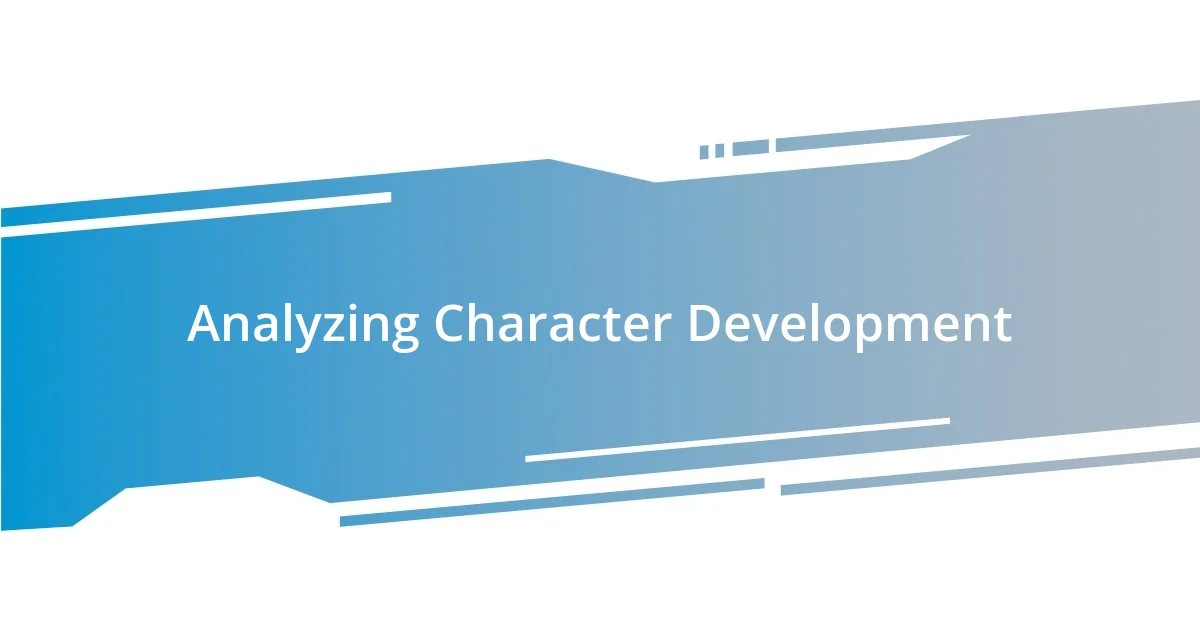
Analyzing Character Development
Character development stands as a cornerstone in literature, illuminating the nuances of human experience. When I read Shakespeare’s “Hamlet,” I couldn’t help but be captivated by the complexity of his psychological journey. Hamlet’s internal struggles resonated with my own moments of indecision and despair, drawing me into a deeper understanding of how personal crises shape our very identities. Isn’t it intriguing how a character’s evolution can echo our own life lessons?
I remember feeling a wave of sympathy for Elizabeth Bennet in “Pride and Prejudice.” Her strong-willed nature and biting wit masked a vulnerability that I recognized in myself during my teenage years. As she navigated societal pressures and personal failings, I reflected on my efforts to stay true to myself amid external expectations. Have you ever found strength in a character who seemed to mirror your own battles?
Exploring the arc of a character like Holden Caulfield from “The Catcher in the Rye” deepened my appreciation for the struggles of adolescence. Holden’s cynical view of the world often reminded me of my own feelings of isolation and confusion during high school. His journey resonated deeply as it mirrored the chaotic transition into adulthood, prompting me to consider how we all wrestle with growing pains in our pursuit of authenticity. What can we learn from these fictional experiences that help us navigate our real-world challenges?
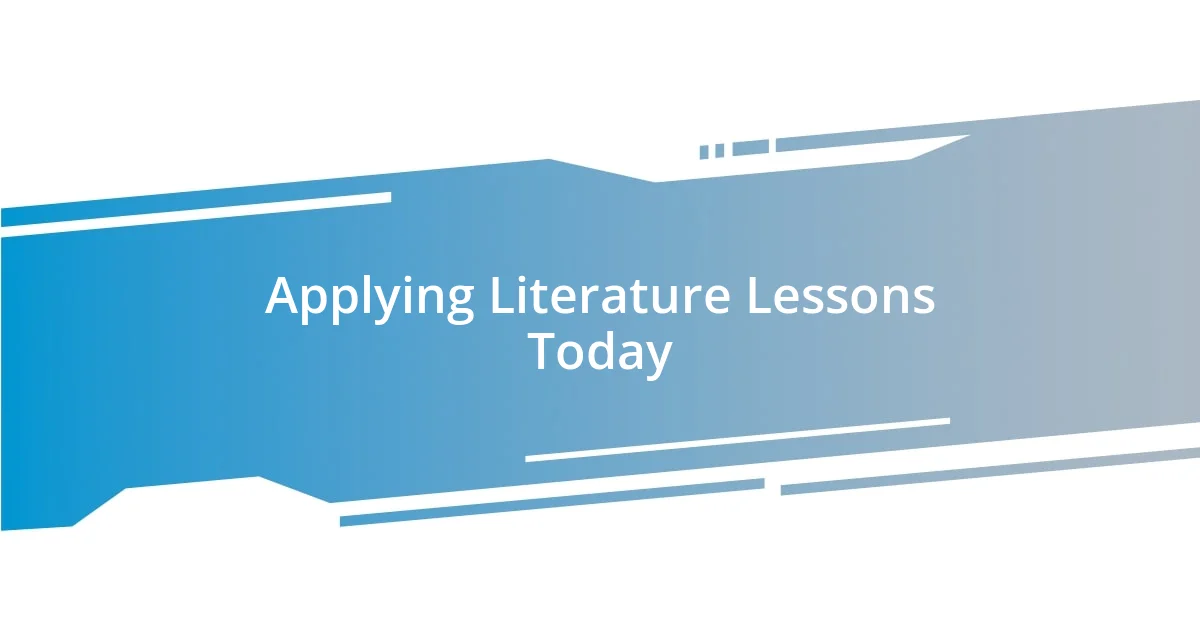
Applying Literature Lessons Today
Reflecting on the teachings from historical literature can genuinely enhance our modern lives. For instance, reading George Orwell’s “1984” made me acutely aware of how easily our freedoms can be undermined. I remember feeling a sense of urgency as I considered the implications of surveillance technology in today’s world. Isn’t it astonishing how a story from the past can shine a light on our current realities?
In exploring the moral dilemmas faced by characters in classic literature, like Jean Valjean in Victor Hugo’s “Les Misérables,” I found valuable lessons about empathy and redemption. His journey from convict to benevolent guardian resonates with me, as it reinforces the idea that people are often shaped by their circumstances, yet still possess the power to change. Can you think of someone in your life who exemplifies such transformative growth?
I’ve often drawn parallels between my own challenges and the societal critiques presented in works like “The Grapes of Wrath” by John Steinbeck. The struggles of the Joad family reminded me of how economic hardships still ripple through our communities today. As I navigated my own financial difficulties, their resilience inspired me to confront my obstacles with a renewed sense of determination. How might we apply the lessons of perseverance seen in these characters to our own lives?
